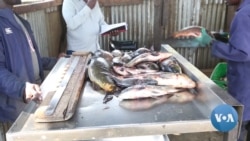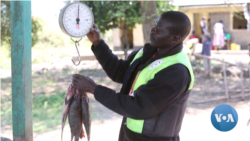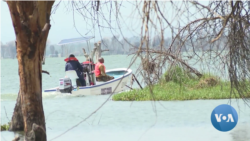Seremiah Oloo is someone who has relied on Kenya's Lake Naivasha for his livelihood as a fisherman for three decades.
But since the start of the coronavirus pandemic, his catch has been dropping continually. Oloo is convinced that is because of an increasing number of illegal fishing boats on the lake.
He says back then he could catch at least 1,000 tilapia fish a day, but now catching just 100 tilapia is very difficult. He says as the fishing community sees the number of boats increasing, there is also an increase in nets and crime.
Kenyan authorities say the economic losses caused by COVID-19 are driving more people to fish illegally. Poaching has tripled since last year and caused the daily catch to drop from an estimated 600 tons to 200 tons, according to Kenya's Maritime Fisheries Research Institute.
COVID-19 has disrupted many livelihoods, with more than 1.7 million people losing their jobs since the pandemic began, according to Kenya's national statistics.
Officials with Kenya's Marine and Fisheries Research Institute say they believe people affected by the pandemic have turned to fishing to help them survive.
The institute’s coordinator Edna Waithera told VOA that poachers are having a negative impact on breeding areas.
''Illegal fishing is normally undertaken around the breeding areas, which are the shallow areas of the lake. So, this destroys the breeding areas of the lake, which are critical habitats for breeding of the fish and taking care of the young fish,'' Waithera expressed.
To protect the young fish populations, the coast guard has been dispatched to the lakes to stop illegal fishing.
''We even have fisheries officers from Kenya fisheries service seconded to coast guards," Daniel Mungai director general at Kenya's state Department of Fisheries Services pointed out. Adding "so, that when it comes to issues to do with fishing enforcement, because we even have areas that are protected for breeding, we got the bit of preventing people who go and use illegal fishing gear."
With the deployment of monitors on Kenyan lakes, licensed fishermen like Oloo hope that fish populations — and their livelihoods — will bounce back soon.







